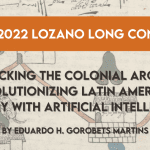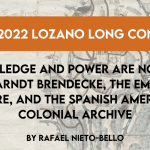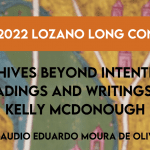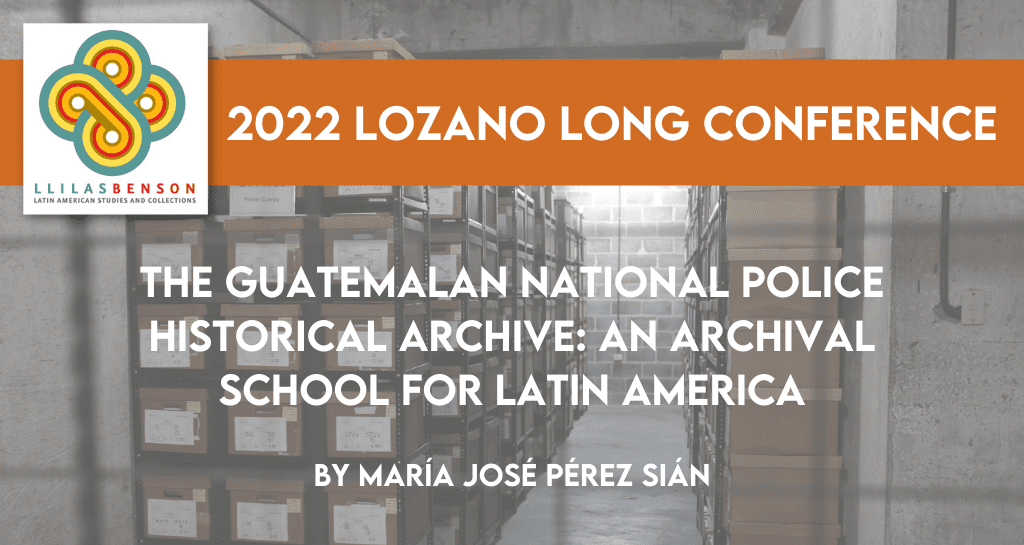
by María José Pérez Sián
In honor of the centennial of the Nettie Lee Benson Latin American Collection, the 2022 Lozano Long Conference focuses on archives with Latin American perspectives in order to better visualize the ethical and political implications of archival practices globally. The conference was held in February 2022 and the videos of all the presentation will be available soon. Thinking archivally in a time of COVID-19 has also given us an unexpected opportunity to re-imagine the international academic conference. This Not Even Past publication joins those by other graduate students at the University of Texas at Austin. The series as a whole is designed to engage with the work of individual speakers as well as to present valuable resources that will supplement the conference’s recorded presentations. This new conference model, which will make online resources freely and permanently available, seeks to reach audiences beyond conference attendees in the hopes of decolonizing and democratizing access to the production of knowledge. The conference recordings and connected articles can be found here.
En el marco del homenaje al centenario de la Nettie Lee Benson Latin American Collection, la Conferencia Lozano Long 2022 propició un espacio de reflexión sobre archivos latinoamericanos desde un pensamiento latinoamericano con el propósito de entender y conocer las contribuciones de la región a las prácticas archivísticas globales, así como las responsabilidades éticas y políticas que esto implica. Pensar en términos de archivística en tiempos de COVID-19 también nos brindó la imprevista oportunidad de re-imaginar la forma en la que se llevan a cabo conferencias académicas internacionales. Como parte de esta propuesta, esta publicación de Not Even Past se junta a las otras de la serie escritas por estudiantes de posgrado en la Universidad de Texas en Austin. En ellas los estudiantes resaltan el trabajo de las y los panelistas invitados a la conferencia con el objetivo de socializar el material y así descolonizar y democratizar el acceso a la producción de conocimiento. La conferencia tuvo lugar en febrero de 2022 pero todas las presentaciones, así como las grabaciones de los paneles están archivados en YouTube de forma permanente y pronto estarán disponibles las traducciones al inglés y español respectivamente. Las grabaciones de la conferencia y los artículos relacionados se pueden encontrar aquí.
Gustavo Meoño Brenner is originally from Guatemala City. Throughout most of his life, he has contributed to the construction of alternatives to the economic, political and social inequalities that plague Guatemalan society. From 2005 to 2018, he took part in a collective effort to rescue the Historical Archive of the Guatemalan National Police, an unprecedented archival record of police activity in Guatemala during more than a century. Because of his decade-long experience at the head of a broad network of collaborators working to save this archive in a very complex local context, Gustavo Meoño Brenner has been invited to speak at the Lozano Long Conference entitled “Archiving Objects of Knowledge with Latin American Perspectives” to be held in February 2022. [1]
A collective effort
The discovery of the National Police Archive in 2005 took many sectors of Guatemalan society by surprise since government and police authorities had denied its existence for decades. These same authorities also denied access to police archives to investigators of the UN-backed Truth Commission and other institutions that resulted from the Guatemalan Peace Accords in the late 1990s.[2] Once identified, legal guardianship over the archive’s contents was accorded to the Office of Guatemala’s Human Rights Ombudsman. In September 2005, Gustavo Meoño assumed the responsibility of coordinating work intended to salvage more than a century of abandoned state archival materials.
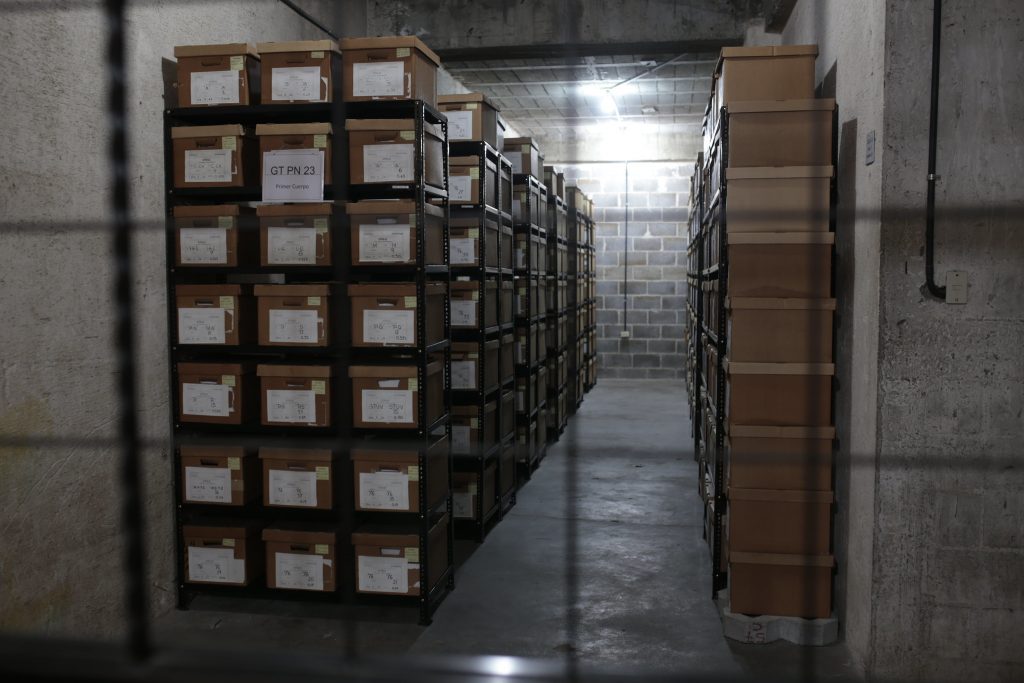
The task of processing and safeguarding this archive was enormous, but, from the beginning, a broad network of individuals and human rights organizations joined forces to protect the integrity of the documents and save them from imminent destruction. In the end, as Meoño states, the archive was opened and made accessible in part because of the widely-shared idea that “the advanced state of deterioration of the archive and the ongoing process of destruction of many documents would make their rescue impossible.”
The network created to salvage the archive included national and international allies who contributed their knowledge and advice to a local team of archivists willing to debate, train, and educate themselves on appropriate and timely conservation methods. Links with researchers and academics, such as Dr. Kate Doyle and Dr. Trudy Huskamp Peterson, were extremely beneficial, as was the exchange of experiences with personnel from the Police Archive of the Province of Buenos Aires in Argentina, and the Judiciary Archive in Guatemala. As a result, and despite limited material and technical resources, the National Police Historical Archive became an innovative archival training ground for more than a decade.
Over thirteen years, Guatemalan archivists implemented and standardized archival processes to conserve and organize physical documents. This process helped to restore the institutional order in which the National Police had produced the documentation, and to implement a process of digital reprography that allowed the digitization of nearly 23 million pages of documents. Many of these documents have been made available in the United States by the University of Texas at Austin through a 2011 agreement with the Archive related to the exchange of technical expertise between the two institutions, as well as research, legal and academic protocols and capacity-building. The agreement is crucial to the study of state archives and human rights in Central America.
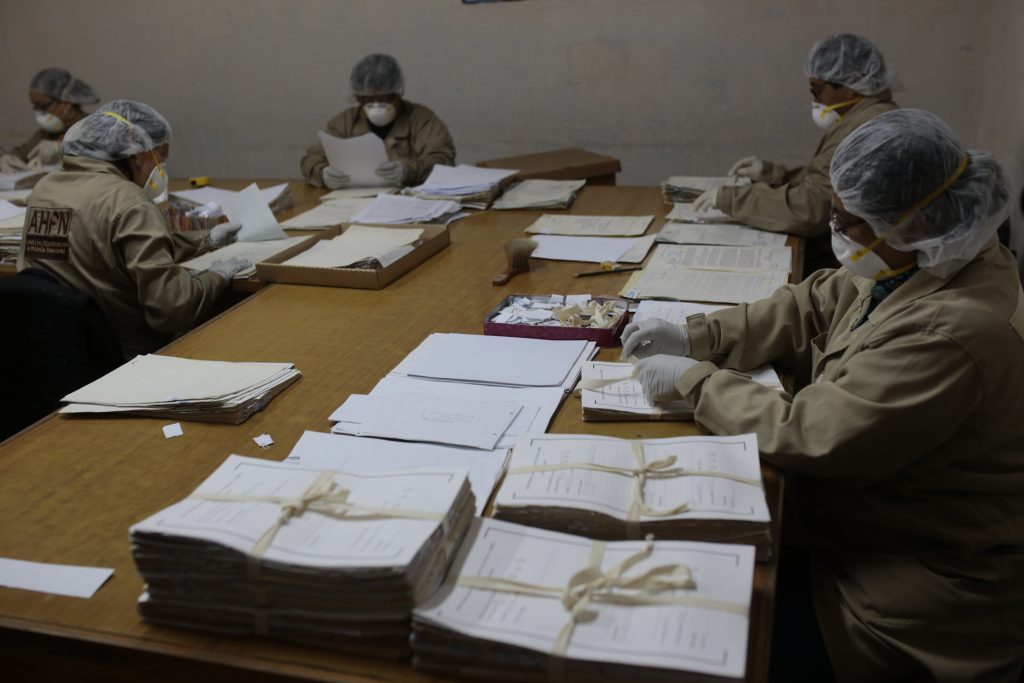
In addition to providing public access to documentation, the archive team established a series of services due to the specific needs of the Guatemalan context. They created an analysis service to explain the documents and their institutional origin that also included information on the police’s organizational structure, including dependencies, precinct jurisdictions, and units. Another service rendered expert findings concerning specific archival documents presented before Guatemalan courts prosecuting human rights violators. Archive researchers and investigators, including Velia Muralles, Ada Melgar, and Gabriela Sigüenza, have provided and continue to provide expert testimony in fourteen legal proceedings brought against former police and military officials in which “their expert opinion is presented as a technical argument and the police documents as evidence” by the prosecution.
Groundbreaking publications
During the time that Gustavo Meoño coordinated the Archive, the team under his direction compiled a partial institutional history of Guatemala’s National Police in fourteen volumes, published between 2010 and 2018. Historian Emy Morán and the Archive’s investigations service, directed by Claudia Estrada, coordinated and edited the first ten volumes related to the functions and evolution over time of police structures and dependencies. Dr. Patrick Ball coordinated the eleventh volume, a quantitative analysis that offers statistical findings on the points of origin and destination of sampled police documents, their year of publication, level of legibility, and the working relation they illustrate between the police and military. The twelfth volume addresses preliminary research findings pertaining to the criminalization of the LGBTQI+ population.
The last two volumes, one of which was co-published with the Latin American Faculty of Social Sciences (FLACSO), Guatemala, deal with issues related to the General Staff of the Presidential Guard, the legal authentication of confidential military documents originating from the Army General Staff, the criminal liability of former National Police officials for past human rights violations, and the creation of ad-hoc criminal tribunals in 1982 and 1983 to punish acts of sedition under the military dictatorship of General Efraín Ríos Montt. More generally, the fourteen volumes published by the National Police Archive contain valuable information from a very unique repository created by an institution meant to surveil and control Guatemalan society in the context of a counter subversive war, in the process committing grave and lasting offenses against the population.
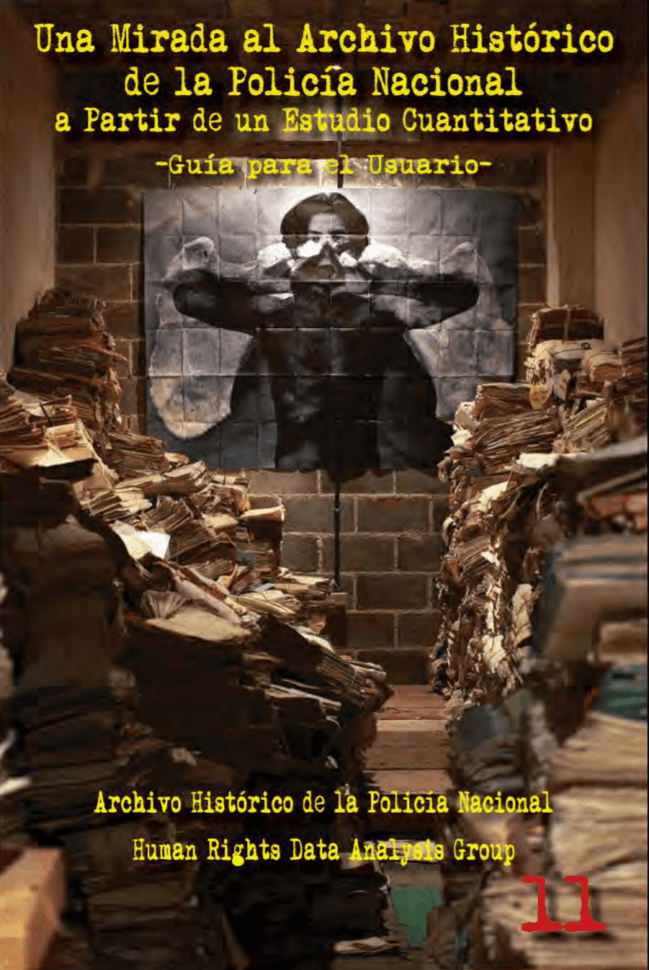
In 2018, the Guatemalan government severely curtailed public access to police documents and dismissed archive workers. A series of legal complaints were also filed against Gustavo Meoño and other individuals responsible for the Archive’s rescue and administration. Despite these setbacks, Gustavo Meoño’s contributions to the fields of human rights and historical memory remain relevant both in Guatemala and beyond. He is currently responsible for coordinating Memory and Human Rights initiatives for the Democracy Foundation in Rosario, Argentina.
At present in Guatemala, the daily operations of the Police Archive are irregular and public access to police documents is deficient. For this reason, the collection of Guatemalan National Police documents at the University of Texas at Austin is of great importance for students of Latin America. It includes additional information from the Social Welfare Secretariat of the Presidency pertaining to adoptions of Guatemalan children during different military governments, as well as digitized information from Guatemala´s National Newspaper Library. In summary, the digital collection of the Guatemalan National Police at UT is a valuable primary source from which many new research possibilities can and will emerge.
María José Pérez Sián has a B.A. degree in Anthropology from the Universidad de San Carlos de Guatemala (USAC). She holds a Master’s degree in Social Sciences and Humanities from the Centro de Estudios Superiores de México y Centroamérica (CESMECA) of the Universidad de Ciencias y Artes de Chiapas (UNICACH). Her main lines of research are violence and genocide, feminisms, bodies and sexualities, and transitional justice. She is currently a doctoral student in the Department of History at the University of Texas at Austin where she is researching the criminalization of sexual dissidence in the Guatemalan National Police Historical Archive.
[1] Much of the content for this article comes from interviews conducted with Gustavo Meoño Brenner on 28-29 October 2021, and Velia Muralles on 7 November 2021.
[2] Comisión para el Esclarecimiento Histórico (CEH), Guatemala, memoria del silencio (Guatemala: Oficina de Servicios para Proyectos de las Naciones Unidas (UNOPS), 1999).
Reference note
From 2010 to 2018, the National Police Historical Archive of Guatemala published the following fourteen volumes, ten of which are accessible through UT’s LLILAS Benson Digital Collections: https://ahpn.lib.utexas.edu/related_resources. The author wishes to thank Daniel Barczay, former researcher at the Archive, for his help in tracking down the last four volumes of the collection.
La Policía Nacional y sus Estructuras (Guatemala: AHPN, 2010).
Del Silencio a la Memoria: Revelaciones del Archivo Histórico de la Policía Nacional (Guatemala: AHPN, 2011).
Dirección General de la Policía Nacional, 1975-1985 (Guatemala: AHPN, 2011).
Inspectoría General de la Policía Nacional, 1975- 1985 (Guatemala: AHPN, 2011).
Gabinete de Identificación de la Policía Nacional, 1975-1985 (Guatemala: AHPN, 2011).
Jefatura de la Policía Nacional en el Departamento de Quetzaltenango, 1975-1985 (Guatemala: AHPN, 2011).
Centro de Operaciones Conjuntas de la Policía Nacional, 1975-1985 (Guatemala: AHPN, 2012).
Departamento de Investigaciones Criminológicas de la Policía Nacional, 1968-1986 (Guatemala: AHPN, 2012).
Segundo Cuerpo de la Policía Nacional, 1975-1985 (Guatemala: AHPN, 2012).
Cuarto Cuerpo de la Policía Nacional, 1975-1985 (Guatemala: AHPN, 2012).
Testigos del Tiempo. Archivos y Derechos Humanos (Guatemala: AHPN/ FLACSO, 2013).
Una mirada al Archivo Histórico de la Policía Nacional a partir de un estudio cuantitativo. Guía para el Usuario (Guatemala: AHPN/ HRDAG, 2016).
La Criminalización de la Población LGTBI en los Registros Policiales, 1960-1990 (Guatemala: AHPN, 2018).
Casos de Víctimas de los Tribunales de Fuero Especial en los Expedientes Policiales, 1982-1983 (Guatemala: AHPN, 2018).
The views and opinions expressed in this article or video are those of the individual author(s) or presenter(s) and do not necessarily reflect the policy or views of the editors at Not Even Past, the UT Department of History, the University of Texas at Austin, or the UT System Board of Regents. Not Even Past is an online public history magazine rather than a peer-reviewed academic journal. While we make efforts to ensure that factual information in articles was obtained from reliable sources, Not Even Past is not responsible for any errors or omissions.

